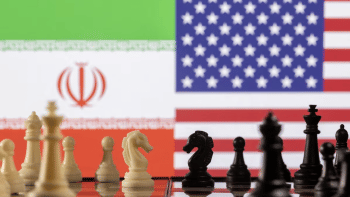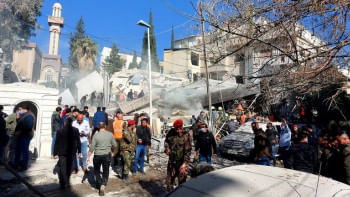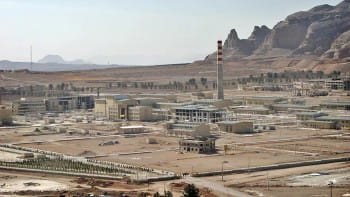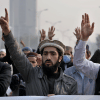Iran’s attacks on Israel: Bark, not bite

Between April 13 and 14, almost seven months into the genocidal war in Gaza, Iran launched a historic attack on Israel. Contrary to the narrative pushed forward by Israel and the West, Tehran's attack was not "unprovoked," but rather "retaliatory." Earlier this month, Israel hit the Iranian consulate in Damascus and killed two Islamic Revolutionary Guard Corps (IRGC) generals and five officials. Iran's argument for the attack rests on the same premise that Israel has been (mis)using in its war in Gaza: the "inherent right" to self-defence, as enshrined in Article 51 of the UN Charter.
The scale of Iran's attack, however, was unprecedented. It was the single largest drone attack carried out by a country in global history. The tit-for-tat threats that have been exchanged between Iran and Israel-US laid the groundwork for this weekend's retaliatory strikes. Iranian proxies, the Houthis in Yemen and Hezbollah in Lebanon, have been in direct confrontation with Israel. Just last month, Israel carried out more airstrikes in Lebanon, taking the death toll to more than 240. Israel's airstrikes on Damascus were undoubtedly an escalation of its ongoing confrontation with Hezbollah. The reckless attack on a diplomatic site, in breach of the Vienna Convention, shows that Israel severely misjudged Iran's willingness to attack directly instead of through its proxies. Inadvertently, Israel forced Tehran to make the decision; if it had not responded and instead relied on its proxies, Tehran would have risked weakening itself and its allies against the threat of Israel. On the other hand, if Tehran had gone in too aggressively by utilising its maximum military capacity, Israel would have had the opportunity to leverage the damage to coerce the US into a regional war. In the end, Iran's response seems to have struck the right diplomatic balance, for now. Only time will tell if Tel Aviv is willing to breach Iran's newly drawn red lines.
There was plenty of warning for the aerial attacks, and even the nature of the attack. Both US intelligence officials and Iranian officials had told The New York Times on April 12, that Iran is expected to mount an attack on Israel soon, but they will steer clear of attacking US military forces in the Middle East to avoid inciting a direct conflict with the US—which is exactly what materialised.
The hundreds of ballistic missiles did not reach their target; in fact, they had little chance of success to begin with. When Iran launched its attack on Israel, from 1,000 miles away, it gave the Israeli defence system and the US forces in Jordan and Iraq more than enough time to prepare a fend-off. While the world held its breath as videos of Iranian drones and terrifying fireworks surfaced on social media, the attack seemed to have been designed to do just that: ignite fear, create a spectacle, and show symbolic muscle power.
The biggest damage that Iran's aerial attacks have done is taking the world's attention away from Israel's genocide in Gaza.
If Iran had intended to cause more than the little damage that its attacks have done, they would've strategically targetted Israel through Hezbollah by unleashing the group's deadly arsenal reach. The geographical proximity of Lebanon and Israel would've also exhausted Israel's extensive air defence system. Tehran wanted to respond to the direct attacks on its consulate in order to reinstate itself as a threat, but it evidently did not want to escalate tensions further. Iran's attacks seem to have been choreographed to bark, not bite. Their significance lies in the symbolism of the country's first-ever direct attack on Israeli soil, after decades of being arch-enemies.
The US'diplomatic efforts, which have shaped the parameters and outcomes of the war in Gaza, conveyed two contrasting messages. The US publicly reassured Israel of its "ironclad commitment." On the other hand, Biden directed a warning to Netanyahu—who, at this point, appears as though he is Biden's errant, disobedient son—that the US will not participate in any Israeli counter-offensive against Iran. The Biden Administration cautioned Netanyahu against continuing the game of implicating the US in his personal wars. By doing so, the US has planted wedges between itself and its closest ally in the region. But this warning itself, when juxtaposed with the high degree of US intelligence on Iran's operation, suggests that the possibility of a back-channel engagement between Iran and Western leaders prior to the attacks cannot be completely ruled out. The US and Iran often exchange big resounding words, and mostly the word "don't." But so far, both seem withdrawn to drag Israel's genocidal war on Gaza into a Third World War. Even before Iran's drones had reached Israel on Saturday night, its mission to the United Nations mysteriously announced on X (formerly Twitter) that "the matter can be deemed concluded."
Though it caused little physical damage, one of the most significant damages of Iran's actions is leaving the world to again brace itself for a response from Israel, the magnitude of which will soon unfold. It's up to Israel now, and that phrase is more dangerous for the world than anything else; even for the US president, who has privately expressed concern that Netanyahu is trying to drag the world into a broader, wider conflict, according to top US officials. It is also worth noting that Netanyahu has clashed with previous US administrations over Iran, openly lobbying against former President Barack Obama's nuclear deal with Iran in 2015, before gaining success with the Trump administration.
"De-escalation," has been echoed by Saudi Arabia, the Arab states, the UN, and Israel's Western allies. But the response is up to the Israeli war cabinet, which is characteristically and catastrophically escalatory. Put simply, Israel likes to bite. The Biden administration has utterly failed to influence and de-escalate Israel's genocidal response to the October 7 Hamas attacks. This brotherly dialogue from the US to Israel, which can be summed up with the phrase "don't do something you'll regret," has not yet worked as Israel has shown no ounce of regret over their bloody campaign in Gaza. Israel has not abided by the UNSC ceasefire—where the US abstained—and the death toll of Gazans has now crossed 33,000 since October 7.
Israel's defence minister has stated, "It's not over yet." An Israeli official also told CNN that Israel is yet to determine whether to try and "break all the dishes" or do something more measured. As the United Nations Security Council met to discuss Iran's attack, Israeli forces again bombed the Nuseirat refugee camp in central Gaza, killing five and wounding dozens on Monday. So, the biggest damage that Iran's aerial attacks have done is taking the world's attention away from the genocide in Gaza. The world is now preoccupied to contain a wider spillover, while innocent Palestinians are being killed by raining Israeli bombs and starvation, because no world power has been able to stop the ruthless Israeli regime.
Ramisa Rob is a journalist at The Daily Star.
Afia Ibnat is a political analyst and executive member of Shorolota Foundation. She can be reached at [email protected]
Views expressed in this article are the author's own.
Follow The Daily Star Opinion on Facebook for the latest opinions, commentaries and analyses by experts and professionals. To contribute your article or letter to The Daily Star Opinion, see our guidelines for submission.

 For all latest news, follow The Daily Star's Google News channel.
For all latest news, follow The Daily Star's Google News channel. 









Comments